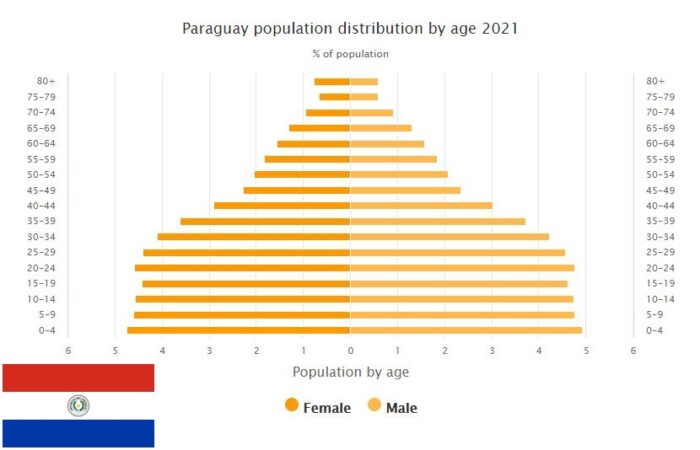Yearbook 1996
Paraguay. At the beginning of May, the leading unions conducted a two-day general strike; they demanded a salary increase of 31% (instead of the 10% offered by the government) and the resignation of President Juan Carlos Wasmosy. 50 people were injured and 20 arrested in connection with the strike.
During a power struggle between President Wasmosy and Army Chief Lino Oviedo, the latter threatened in April to have his troops attack the presidential palace. He was, however, eventually maneuvered from his command position by Wasmosy. United States, and later turned over to a military court.
The first free municipal elections in June 91 caused a significant decline for the Colorado Party and gave the opposition considerable progress. In the capital Asuncion, this was especially true of the independent movement, Asuncion for All. The leader of this movement, Carlos Filizzola, a young doctor of 31 years, was supported by CUT and by other social groups and elected as mayor of Asunción by more than 35% of the vote. At his deployment, he promised to develop a management for the benefit of the public sectors of the city.
- ABBREVIATIONFINDER.ORG: What does PY stand for? In the field of geography, this two letter acronym means Paraguay. Check this to see its other meanings in English and other 35 languages.
In the election to the Constitutional Assembly held in December, the Colorado Party got 60% of the vote. Domingo Laínos PLRA came in second with 29% and Filizzola’s Movimiento Constitución para Todos came in third place.
The new Constitution of 1992 replaced the 1967 one that Stroessner had drafted. Neither the President of the Republic, the Supreme Court, nor Congress participated in the publication of the new constitution, which included comprehensive rules for the protection of human rights and prohibited the death penalty for simple crimes.
Repeated allegations of corruption within the army – including drug trafficking – were the cause of investigations. Arrest warrants were issued against a number of generals. Among other things. the commander of the army.
In December, Paraguay, together with Argentina, Brazil and Uruguay, signed an agreement on the creation of a common market, Mercosur, to enter into force in 1995.
In a climate marked by threats of electoral fraud and military declarations to hold the ruling Colorado Party in power, government candidate Juan Carlos Wasmosy got 40% of the vote in the May 1993. 75% of the 1.7 million eligible voters. Border military units prevented Paraguayans living in Argentina and Brazil from participating in the elections. PLRA got 33% of the vote and Encuentro Nacional – a coalition of business people – got 25%.
When Wasmosy was deployed in August, he became the first elected civilian president in the country’s 182-year independence. Congress for the first time assigned civilian control over the military.
In September, the Jewish World Congress turned to Wasmosy to ask for access to the government archives to locate the Nazis who had fled to Paraguay after World War II.
In May 94, the Parliament passed a law prohibiting the participation of military people in party political activity. It immediately led the government and the military to take action to make the law unconstitutional. This attitude caused the opposition parties to break the cooperation pact with the Colorado Party.
Following pressure from the United States, Wasmosy appointed General Ramón Rozas Rodríguez as chief of the drug fight. Rozas was assassinated in 94 before presenting a report on the illegalities in the military hierarchy – including General Lino Oviedo.
Violent clashes between farmers and police took place in a number of the country’s regions. 100 protesters who blocked the road to Asuncion were injured by rubber bullets. The peasants were supported by ecclesiastical organizations, trade unions and opposition parties. In May, a general strike was declared for higher wages and agricultural reforms, as well as in protest against the privatization of state-owned companies. The government acknowledged that purchasing power had declined by 42% over the previous 5 years and increased wages by 35%. In December, all timber exports were banned to halt forest felling.
In January 1995, the National Commission on Human Rights stated that many of the criminal acts of the Stroessner period remained unpunished and that the killing of peasants continued.
In April 96, the president retired eight high-ranking military people. General Oviedo rejected the order and rebelled with a group of young officers. From his refuge in the United States Embassy, President Wasmossy Oviedo appointed Secretary of Defense, in order to curb the crisis. Later, the appointment was withdrawn. In May, the Colorado Party and the opposition agreed to ban the participation of military people in political activity.
At the internal elections in the Colorado Party in September 1997, Lino Oviedo was named presidential candidate with 36.8% of the vote against Luis María Argañas 35% and Wasmosy’s candidate, Carlos Facettis 22.5%. In October, however, Oviedo was arrested on charges of rebellion.
Population 1996
According to Countryaah.com, the population of Paraguay in 1996 was 4,776,732, ranking number 109 in the world. The population growth rate was 2.490% yearly, and the population density was 12.0233 people per km2.
